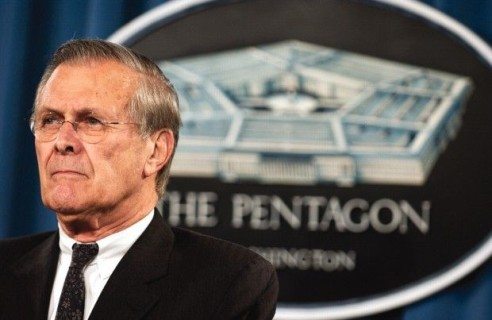
 New York's Documentary Festival, or DOC NYC, opens to the public on November 14 at the SVA Theater. The night shall be one to remember for documentary fans, as Academy Award-winning filmmaker Errol Morris will be on hand to discuss his new movie, "The Unknown Known". The opening night film marks the second time Morris and one of his works will appear at DOC NYC, following "Tabloid" in 2010.
New York's Documentary Festival, or DOC NYC, opens to the public on November 14 at the SVA Theater. The night shall be one to remember for documentary fans, as Academy Award-winning filmmaker Errol Morris will be on hand to discuss his new movie, "The Unknown Known". The opening night film marks the second time Morris and one of his works will appear at DOC NYC, following "Tabloid" in 2010.
"The Unknown Known" is a look back at the career of former Secretary of Defense Donald Rumsfeld, as told by Rumsfeld himself. Morris interviewed the notorious politician over the course of several days about everything from his escape from the Watergate Scandal to his planning of the Iraq War. Breaking up these talking head segments is relevant footage and snippets from Rumsfeld's career, most notably press conferences and written memorandums.
The format is very similar to one of Morris' most famous works, "The Fog of War". That film, which earned Morris his only Oscar, centered on former Secretary of Defense Robert S. McNamara. In "The Fog of War", McNamara shows a fascinating amount of knowledge and respectable accountability for his war-time actions. Even though we know him as the man who played a huge role in the escalation of the Vietnam War, by the end of the film we cannot villainize him in such an outright way. His awareness and acknowledgement of his mistakes doesn't make him an easy target, and made "The Fog of War" a thought-provoking piece.
"The Unknown Known" suffers from not having a subject that's as forgivable (if that's the right word) as McNamara. Unlike the Vietnam War, the Iraq War is still fresh in our minds, so whatever opinion the public holds is essentially carved in stone. If you disliked Rumsfeld before, you are going to have fun laughing at everything he says to defend himself here. You'll feel vindicated by Morris' selection of press conference clips, that show Rumsfeld constantly dodging questions or saying things that we know now to be fallacious (ie, weapons of mass destruction).
Whereas McNamara looked back on his choices and admitted some fault (to an extent), Rumsfeld still stumbles his way into justifying every decision he made. It doesn't matter if he contradicts himself or just says something ridiculous; If he feels it gets him off the hook, he says it and believes it wholeheartedly. The title of the film itself ends up being a perfect example of Rumsfeld saying whatever it takes to be correct in the moment. In one of his thousands of memos, Rumsfeld defines the phrase "unknown knowns" in a certain way. When Morris asks him to define the phrase again for the camera, he gives the complete reverse definition. When the mistake is pointed out to him, he claims to have just made a mistake when writing the memo. Is he telling the truth, or just protecting himself in the moment? That's what Morris wants you to ponder. "The Unknown Known" won't change any minds, but does offer some insight into the mind of one of the major players of the 21st century's first war.